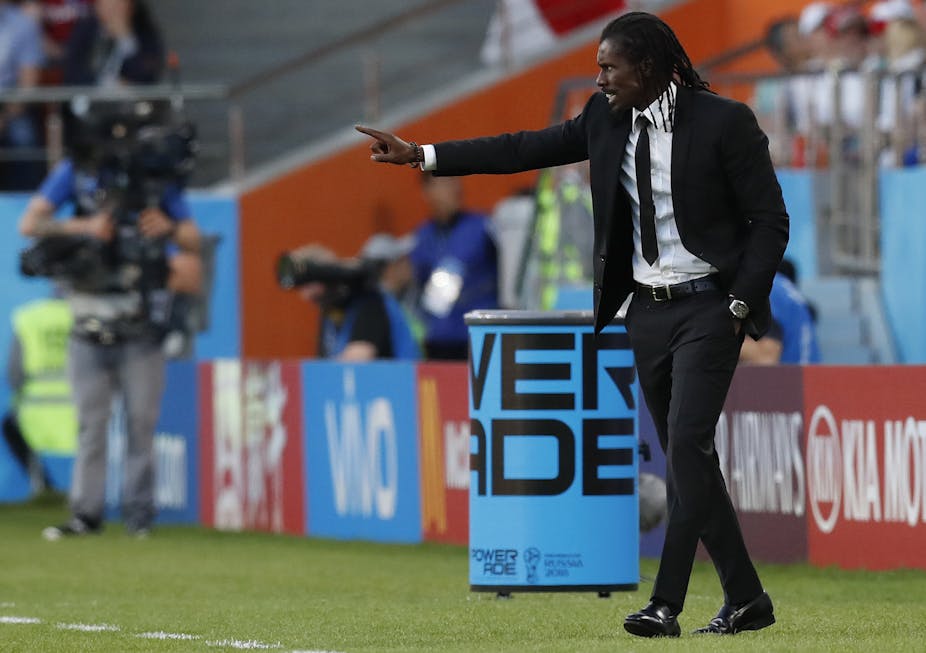For the five African teams, Senegal, Nigeria, Morocco, Tunisia and Egypt, the 2018 FIFA World Cup in Russia was a tournament of regret. Not even the fact that eventual champions France was packed with players with African roots, could heal the hurt. What made it more painful was that the continent’s strongest contender, Senegal, fell victim to FIFA’s controversial “fair play” rule. The West Africans were eliminated because they had more yellow cards than Japan.
The overall statistics paint a disappointing picture. All five African teams exited in the first round, making it the worst performance by the continent since 1982, the last time not one African team made it to the second stage. Since then, Cameroon (in 1990), Senegal (2002) and Ghana (2010) have made it to the quarterfinals. Nigeria has regularly progressed to the second round.
North African teams have been less successful on the whole, but Morocco (in 1986) and Algeria (2014) at least reached the second round.
So does this year’s tournament represent a step back for an entire continent’s football dreams? The results would appear to suggest so. The five teams managed only three wins in 15 games. But there were encouraging performances from Nigeria and Morocco along the way, as well as Senegal. And it’s fair to say that it was unfortunate for the Senegalese to get knocked out at the first hurdle in the cruellest possible way.
Senegal’s proud history
The Senegalese team arrived in Russia quietly confident that they would be able to replicate the success of the famous exploits of the country’s team in 2002. The team was drawn in an evenly matched group which contained neither overwhelming favourites nor rank outsiders. Coached by the captain of that year, Aliou Cissé, many observers tipped the Lions de la Teranga to advance to the next round, and possibly even further.
Things got off to a good start as they dispatched Poland 2-1 with the help of a controversial Mbaye Niang goal, the player reentering the pitch to score immediately after receiving treatment for a minor injury. Following a hard-fought 2-2 draw against Japan, Senegal needed only to avoid defeat in the final group match against Colombia to ensure progress.
It was here that their hopes began to unravel. One moment of inattention at a corner kick was enough to allow Colombia’s Yerry Mina to head what would prove to be the winning goal. Senegal, equal to Japan on points and goals scored, became the first team in World Cup history to be eliminated via the fair play ranking – they had two more yellow cards than their rivals.
Victim to innovations
This was not the first time that Senegal had fallen victim to the quirks and innovations in the game’s rules which are regularly unveiled, or scrapped, during major tournaments. Earlier in their game against Colombia, Sadio Mané won a penalty after being tackled by Davinson Sanchez in the penalty area, only for the referee to revoke the decision upon consulting the Video Assistant Referee (VAR) technology. The VAR was introduced to the World Cup for the first time this year.
In 2002, Senegal conceded the last ever Golden Goal scored in men’s international football to Turkey’s Ilhan Mansiz. This “sudden death” rule was subsequently changed, as it was deemed unfair that the conceding team should lose immediately without having the chance to respond. It appears likely that the fair play ruling will also make a swift exit, as its consequences were anything but fair.
Senegal could consider themselves hard done by, and rightly registered a formal complaint to FIFA asking the sport’s governing body to rethink the fair play rule. However, it would be incorrect to suggest that Senegal’s failure to progress beyond the first round was due to bad luck alone.
Criticisms and accolades
Aliou Cissé, the team’s charismatic coach won him many admirers during the tournament with his elegance and passion on the touchline. He will be left wondering if his approach was perhaps a little bit too cautious, especially during the Japan and Colombia games.
Whereas African teams at previous World Cups have been stereotyped as being exciting yet tactically naïve, the current Senegal squad displayed a tactical discipline and defensive solidity which reflected the fact that almost all of the players are employed in major European leagues.
But, for all the stability which Cissé managed to instil in his team, he failed to fully unleash the potential and flair of his highly talented attacking players. The totemic Sadio Mané was a mere shadow of the player who was so instrumental in Liverpool’s run to the European Champions’ League final last season. Also, the likes of Keita Baldé Diao and Diafra Sakho only featured sporadically – leading to criticism from some quarters that Cissé’s selections were too defensive.
Overall, however, there are many positives for Senegal to take from this World Cup. Although the result was disappointing, the team showed that they have a great deal to build on for future campaigns. It appears likely that the federation will persevere with Cissé, who showed that local coaches can more than compete with the sorciers blancs (“white magicians”) – European coaches who are often parachuted in to coach African sides at major tournaments.
As talented and youthful players such as Mané, Diao and Ismaila Sarr continue to improve and gain experience at the highest level, there is plenty to be optimistic about in Senegalese football.

